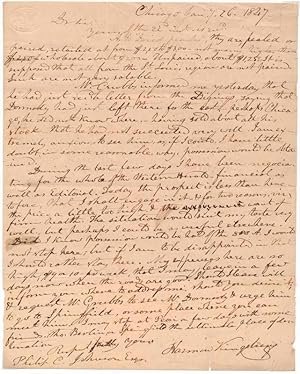KINGSBURY, HARMON 1826 1868 (1 resultados)
Tipo de artículo
- Todo tipo de artículos
- Libros (1)
- Revistas y publicaciones
- Cómics
- Partituras
- Arte, grabados y pósters
- Fotografías
- Mapas
-
Manuscritos y
coleccionismo de papel
Condición
- Todo
- Nuevos
- Antiguos o usados
Encuadernación
- Todo
- Tapa dura
- Tapa blanda
Más atributos
- Primera edición
- Firmado
- Sobrecubierta
- Con imágenes del vendedor
- Sin impresión bajo demanda
Ubicación del vendedor
Valoración de los vendedores
-
Autograph Letter Signed
Librería: Main Street Fine Books & Mss, ABAA, Galena, IL, Estados Unidos de America
Ejemplar firmado
This Cleveland merchant became well-known as an abolitionist, reformer and occasional publisher; among his writings are "The Sabbath" (1840), "The Immigrant's Good Samaritan" (1848), "Law and Government" (1849), "Thoughts on the Fugitive Slave Law and Nebraska Bill" (1955), "The Great Law Book" (1857), "Word of Christ" (1857) and "The Slavery Question Settled" (1862). ALS, 1p + integral address leaf, 7 3/4" X 9 3/4", Chicago, IL, 1847 January 26. Addressed to Philip C. Johnson (Illinois secretary of state). Very good. Mildly but evenly age toned; small separations along original folds neatly and archivally repaired on blank verso. Opens, oddly, with a discussion of the price of dried peaches -- Kingsbury was a merchant, after all! "Mr. Grubbs informed me yesterday that he had just rec'd a letter from the Digings, saying that Dormody had just left there for the east -- perhaps Chicago. having sold about all his stock -- that he had not succeeded very well. I am extremely anxious to see him, as, if I could, I have little doubt, in some reasonable way, possession would be obtained." Dormody is no doubt William Dormody (1796-1876), an Irish-born merchant and businessman who left the Midwest around this time to try his luck in the goldfields of California -- and succeeded; here Kingsbury appears to lust after Dormody's unsold merchandise. He then discusses what appears to be the acquisition of a newspaper -- seeking, no doubt, a soapbox from which he could broadcast his controversial abolitionist and reform views. ".I have been negociating for the whole of the Western Herald -- financial as well as Editorial. Today the prospect is less than heretofore, that I shall engage in it -- & for two reasons, vis, the price a little too high, & the want of firm health. The situation would suit my taste very well, but perhaps I could be as useful elsewhere. My expenses here are so high, $9 or 10 per week, that I may leave in a few days, now when the roads are good." Fine content addressing both of Kingsbury's concerns: pursuing merchandise to stock his Cleveland store, and pursuing a newspaper purchase to further his reform agenda. Quite uncommon.


